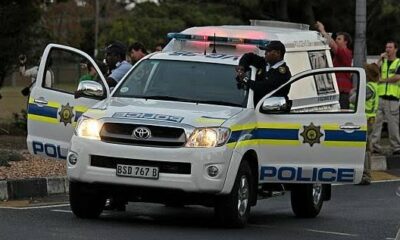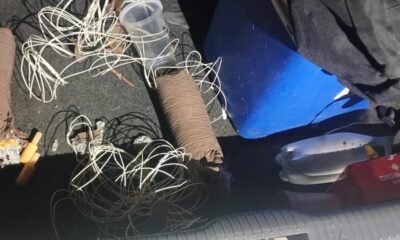News
Time to Take Back Our Streets: Why South Africa Must Rebuild and Reinforce Its Law Enforcement System

South Africa’s crime epidemic isn’t just a daily headline—it’s a harsh reality for millions, especially working-class communities of colour and women. While conspiracy theories like “White Genocide” are unfounded distractions, the real emergency is a broken criminal justice system that is failing the very people it was meant to protect.
For decades, crime has plagued South Africa. But fixing it isn’t just about hiring more police—it’s about building a smarter, better-resourced, and community-oriented law enforcement system. Despite efforts since 1994 to transform the South African Police Service (SAPS) from an oppressive force into a service of protection, crime continues to take its toll. The recent drop in violent crimes like murders and cash-in-transit heists is promising, but far from enough.
The Gaps in Our Defence
While the police force has grown, it hasn’t kept pace with population growth or international best practice in terms of police-to-population ratios. Officers are often left without functioning vehicles, proper equipment, or even protective gear. Their pay is not competitive, which risks exposing them to bribery and corruption from powerful criminal syndicates.
The National Prosecuting Authority (NPA) has also been stretched thin, hindered by staff shortages and austerity cuts. Though a recent allocation for 250 more prosecutors is a welcome step, real progress demands stronger financial commitment. The same goes for our courts, which remain bogged down by outdated, paper-based systems and long trial delays. It’s no wonder many victims of crime never see justice.
Reforming the System, Not Just the Surface
The solution requires a multi-layered approach. First, invest in the recruitment, training, and retention of police officers and prosecutors. Second, modernise our court infrastructure and digitise records. Correctional Services must shift from being safe havens for criminal networks to centres for rehabilitation, offering real skills and second chances to inmates.
Home Affairs should work hand-in-hand with SAPS to build a national biometric and DNA database, critical for tracking down repeat offenders. Meanwhile, the South African Revenue Service (SARS) needs the muscle to crack down on illicit trade and conduct lifestyle audits on those flaunting unexplained wealth.
A National Responsibility
Parliament and Treasury must stop viewing law enforcement as a cost and start treating it as an investment in national stability and growth. Parliament must also get tougher on those who attack police, with stricter bail conditions and harsher sentencing. Life imprisonment must mean just that—life.
But the responsibility doesn’t rest solely with the state. Citizens must adopt a zero-tolerance stance on crime—from littering to corruption—and protect whistleblowers who risk their lives to expose wrongdoing.
Business and International Cooperation
The private sector also plays a key role. Companies must create jobs, pay fair wages, support community policing efforts, and stop fuelling corruption to secure tenders. International partners, from neighbouring SADC countries to global allies, should work with South Africa to curb cross-border crimes like drug smuggling and car theft.
Modern criminal syndicates don’t respect borders—so defeating them will require cross-border collaboration, intelligence sharing, and support in funding, training, and technology.
Crime Is a National Emergency
South Africa cannot grow its economy, reduce poverty, or retain skills without addressing the crime crisis head-on. Strengthening law enforcement isn’t a silver bullet—but it’s the foundation for any real progress. If we’re serious about building a safer, fairer society, then reforming our criminal justice system must be treated as a national emergency—not a budget line item.
Let’s stop normalising crime. Let’s start rebuilding trust.
{Source: IOL}
Follow Joburg ETC on Facebook, Twitter , TikTok and Instagram
For more News in Johannesburg, visit joburgetc.com


























